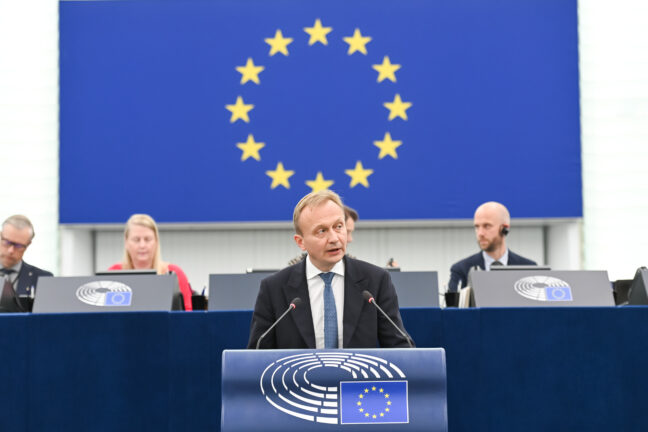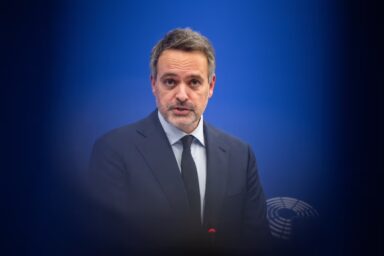Allegations that Hungarian intelligence officials tried to recruit EU staff as spies dominated a tense European Parliament debate on Wednesday, 22 October. The discussion exposed deep political divides over how to respond to what some called an unthinkable act by an EU member state.
The revelations, first reported by Direkt36, claim that Hungarian intelligence officers, working under diplomatic cover at Hungary’s Permanent Representation to the EU in Brussels, attempted to recruit officials in EU institutions between roughly 2012 and 2018. The investigation says these efforts were active during the period when Olivér Várhelyi, now the EU’s Commissioner for Health and Animal Welfare, served as Hungary’s Ambassador to the EU (2015–2019).
For many lawmakers, the story was more than another chapter in Viktor Orbán’s long confrontation with the EU. “There must be no space for espionage in modern EU policy-making”, said MEP Terry Reintke (Greens/DEU). She urged the creation of a parliamentary committee of inquiry. “The allegations of intelligence infiltration within the European Commission must be urgently and thoroughly investigated through a European Parliament inquiry committee,” Ms Reintke said.
Confidental investigation
In Brussels, the European Commission has launched an internal investigation. Opening the debate, Piotr Serafin, the European Commissioner for Budget, Anti-Fraud and Public Administration, acknowledged the gravity of the allegations. “The mere fact that we are now discussing allegations that one of our member states decided to spy on the institutions of our common Union is simply unthinkable”, he told MEPs.
“The mere fact that we are now discussing allegations that one of our Member States decided to spy on the institutions of our common Union is simply unthinkable. —Commissioner Piotr Serafin
Mr Serafin confirmed that an internal investigation was ongoing. However, he declined to share details, citing the need to “ensure the integrity of the investigation”. At the same time, the commissioner stressed that it’s not possible to reconcile spying with the principle of loyal cooperation between member states and EU institutions.
“A new shade on Hungary”
Despite the decision to open an internal investigation, many lawmakers said Brussels was still failing to show real accountability. The most contentious issue remains the executive’s reluctance to suspend Commissioner Olivér Várhelyi.
MEP Birgit Sippel (S&D, DEU) demanded a break with the Commission’s closed-door approach. “This should not be done in secret or remain secret. The public has a right to know what has happened and how such activities could go unnoticed for years,” Ms Sippel said.
You might be interested
For her, the revelations fit a pattern. Hungary’s secret services, Ms Sippel recalled, had been previously suspected of spying anti-fraud office OLAF, when investigating Hungarian misuse of EU funds. “Whenever governments spy on their critics, democracy is under attack. And those who spy on their partners are violating a basic requirement of loyal cooperation”, she added.
Even within the centre-right MEPs frustration surfaced. EPP’s Hungarian MEP Zoltán Tarr openly criticised Prime Minister Viktor Orbán’s government for “serving and representing the interests of Russia in Europe”. He warned that such behaviour “casts a new shade on Hungary”.
MEPs want a parliamentary inquiry
Others framed the issue as a test of political courage. MEP Sophie Wilmès (Renew, BEL) urged the Commission to act decisively. She argued that “Commission should have suspended Commissioner Várhelyi while at least waiting to shed some light on the matter”. Ms Wilmès also backed earlier calls from the Greens for a parliamentary inquiry. “If the Commission isn’t going to act responsibly, it’s up to Parliament to do so. That is why we would support the creation of a committee of inquiry immediately to deal with these issues”, she said.
The Commission should have suspended Commissioner Várhelyi while at least waiting to shed some light on the matter. — MEP Sophie Wilmès (Renew, BE)
Her demand for transparency was echoed by MEP Martin Schirdewan (The Left/DEU). Earlier in the week, he reacted to the revelations: “As a sitting Commissioner, Várhelyi now has high-level access to the most sensitive information in the European Union — a situation that cannot be allowed to continue”, he stated. The Left group called on President von der Leyen to withdraw confidence in Commissioner Várhelyi, and to adopt “measures to protect the European institutions from the malign influence of the Orbán regime”.
Orbán’s allies strike back
Defending Budapest, some right-wing MEPs denounced the debate as politically motivated. They accused Brussels of staging a smear campaign ahead of next year’s Hungarian elections. Csaba Dömötör (PfE/HUN) dismissed the entire discussion as “a laughable campaign”. For the lawmaker, the real issue was Hungary’s refusal to follow the EU’s migration or defence policies.
Echoing him, Polish MEP Patryk Jaki (ECR) described the affair as “another stage of an illegal intervention in Hungary’s election campaign”. Also, MEP Tomasz Froelich (ESN, DEU) downplayed the claims, remarking that having secret agents in Brussels is standard. “Everybody does that”, he argued.
NGOs push for more action
Outside the European Parliament, watchdogs and academics intensified pressure on Brussels. During the week, different organisations warned that the credibility of the European project itself was at stake.
Transparency International EU said it was “deeply alarmed” by reports that Hungary’s Permanent Representation had served as a front for espionage. “If true, these disgraceful allegations that Hungary sought to spy on the EU itself further demonstrate Viktor Orbán’s flagrant disregard for the rule of law across the Union”, said its director, Nicholas Aiossa. The organisation called the Parliament to establish a formal committee of inquiry.
If true, these disgraceful allegations that Hungary sought to spy on the EU itself further demonstrate Viktor Orbán’s flagrant disregard for the rule of law across the Union. — Nicholas Aiossa, director of Transparency International EU
Meanwhile, The Good Lobby, a network of over sixty academics from more than thirty countries, urged von der Leyen to request Várhelyi’s resignation. Such action, they wrote, is “essential to safeguard the Commission’s integrity and uphold public trust in the EU’s institutions”.
What next?
For now, the Commission’s internal inquiry continues behind closed doors, with few public details on its scope. President Ursula von der Leyen has resisted mounting calls to suspend Olivér Várhelyi.
Meanwhile, pressure from Parliament and civil society is building. Several political groups, from the Greens to Renew and the Socialists, are calling for a committee of inquiry. This move would allow MEPs to investigate, demand evidence, summon witnesses and examine how the alleged espionage could have gone undetected for years.











